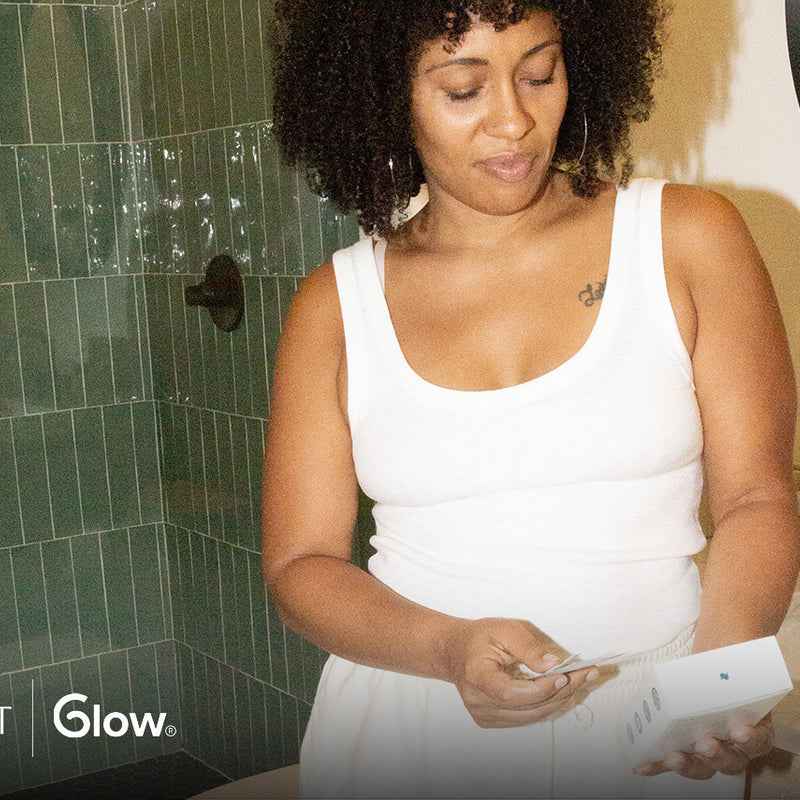How Do I Know if I'm Not Ovulating?

If you’re trying to have a baby, you’ll want to know if and when you’re ovulating. Unfortunately, it’s not always as simple as counting the days between your periods, especially if your cycle is a little irregular. Dr. Gleaton is here to give you the inside scoop on abnormal ovulation and more.
By OBGYN and fertility expert Dr. Kenosha Gleaton
Being able to identify when you’re ovulating is a necessary part of family planning. But perhaps your fertile window has been difficult to pin down, or maybe there are months when you skip ovulation entirely. We’re here to break down what abnormal ovulation is and what symptoms to look out for.
Signs of Not Ovulating
Ovulation refers to the period in your cycle when an egg is released and travels through the fallopian tubes in search of sperm. If you’re trying to conceive, you’ll want to have sex when you’re ovulating to increase your chance of conception. Ovulation can be easily tracked using ovulation midstream tests or test strips, and for a quick estimate, you can also try our fertile window calculator.
If you’re concerned that you aren’t ovulating, there are some symptoms you should be on the lookout for:
- Natural body changes: Your body will give you hints that ovulation is near by altering things such as your basal body temperature and your cervical mucus. For example, if you notice that your cervical mucus is dry through your entire cycle and,, it’s a possible sign that you’re not ovulating.
- Irregular cycles: Cycle lengths can vary from 21-35 days, so if your cycle falls outside of this range, or if your period is absent for months (while not on hormonal birth control), or if your cycle seems to vary by multiple days every month, it’s possible you’re experiencing abnormal ovulation.
- Ovulation test results: If you’ve tried taking at-home ovulation tests and get inconsistent results, such as multiple positive results within one cycle or consistent negative results, talk to your doctor to rule out any hormonal imbalances.
If you are getting consistent negative test results, try testing earlier in your cycle next month to make sure you didn’t miss an early ovulation. Read more about early ovulation in my article, Why Do I Ovulate So Early In My Cycle?
Why Am I Not Ovulating?
In order for ovulation to occur, two hormones (luteinizing hormone and follicle stimulating hormone) must increase. If ovulation isn’t occurring, it’s likely due to a hormonal imbalance. Some common culprits include [1]:
- Polycystic ovary syndrome (PCOS): PCOS accounts for 70-85% of abnormal ovulation because of the hormonal imbalance it causes. If you have PCOS, you’re not alone. About 1 in 10 women are affected and there are still ways to manage and treat PCOS if you’re TTC, from taking a daily myo-inositol supplement to increasing your physical activity.
- Primary Ovarian Insufficiency (POI): Accounts for 10-30% of ovulatory disorders. Commonly mistaken as “premature menopause,” POI is found in women aged 39 and younger and often causes menopausal-like symptoms.
- Amenorrhea: The absence of a period also means the absence of ovulation. Several things can cause amenorrhea like stress, overexercising, and undereating.
- Perimenopause: Can occur in women ages 40-58, and symptoms can last for years. When going through perimenopause, it’s common to skip menstrual cycles- including ovulation.
Am I Not Ovulating This Month, or Ever?
- If you’ve discovered that you didn’t ovulate in your current or most recent cycle, you may be wondering if it’s going to happen again. It’s quite possible you’ve experienced an anovulatory cycle, a fairly common occurrence that happens in about a third of normal menstrual cycles. [2] Anovulatory cycles are nothing to be worried about and can occur from time to time, especially in younger women.
- You should try testing again next month to determine if you ovulate. If you notice you haven’t ovulated in multiple consecutive cycles, you may want to talk to your doctor about what steps to take moving forward.
How to Confirm Ovulation
Still unsure if you’re experiencing abnormal ovulation? Your doctor will be able to definitively tell you if you’re ovulating or not. Here’s what you should expect from your visit:
- Urine tests: If you haven't already been tracking your LH levels using home ovulation test kits, your doctor will have you try these out first to identify if an LH surge is occurring.
- Ultrasound: A transvaginal ultrasound might be the next option. This can help your doctor determine whether or not your follicles are increasing and their size (therefore showing that an egg is growing and being released from your ovaries).
- Endometrial biopsy: This sounds more invasive than it is! A biopsy can show whether ovulation has occurred and if your body responded correctly to the necessary hormones.
- Blood hormone levels: Taking blood samples can show whether or not your body is producing necessary ovulation-stimulating hormones.
- Pregnanediol (PdG) testing: PdG urine tests can confirm if ovulation has occurred. Progesterone levels increase (5 ug/ml) following ovulation and peak about a week before the next menstrual period.
How to Promote Ovulation
Fortunately, there are a lot of options for women who suffer from abnormal ovulation. Depending on your case specifically, some medications can help regulate your hormones to induce ovulation, or you could try fertility treatments such as IVF. Talk to your doctor to determine what path is right for you.
Supplements and Healthy Habits
If only it were that easy! Unfortunately, ovulation can only be stimulated by the release of necessary hormones. Although you do have a greater chance of getting pregnant if you’re healthy overall. This means eating a balanced diet, exercising regularly, and avoiding recreational drugs. You should also be taking a prenatal multivitamin if you’re trying to get pregnant, and try a supplement such as CoQ10, which has been shown to increase fertility and IVF outcomes. [3-4]
Key Takeaways
- Some signs that you may not be ovulating include negative ovulation test results, a steady basal body temperature, or an irregular cycle.
- Abnormal ovulation, including an anovulatory cycle (or “missing” ovulation for a month) is fairly common in some women. If you notice you haven’t ovulated for multiple cycles in a row, you should see your doctor.
- If you’re trying to get pregnant, make sure you’re eating a balanced diet, staying active, and taking a prenatal vitamin.
References:
- Ding T, Hardiman PJ, Petersen I, Wang FF, Qu F, Baio G. The prevalence of polycystic ovary syndrome in reproductive-aged women of different ethnicity: a systematic review and meta-analysis. Oncotarget. 2017;8(56):96351-96358. Published 2017 Jul 12. doi:10.18632/oncotarget.19180
- Prior JC, Naess M, Langhammer A, Forsmo S. Ovulation Prevalence in Women with Spontaneous Normal-Length Menstrual Cycles - A Population-Based Cohort from HUNT3, Norway. PLoS One. 2015;10(8):e0134473. Published 2015 Aug 20. doi:10.1371/journal.pone.0134473
- Zhang Y, Zhang C, Shu J, et al. Adjuvant treatment strategies in ovarian stimulation for poor responders undergoing IVF: a systematic review and network meta-analysis. Hum Reprod Update. 2020;26(2):247-263. doi:10.1093/humupd/dmz046
- Akarsu S, Gode F, Isik AZ, Dikmen ZG, Tekindal MA. The association between coenzyme Q10 concentrations in follicular fluid with embryo morphokinetics and pregnancy rate in assisted reproductive techniques [published correction appears in J Assist Reprod Genet. 2017 May;34(5):607]. J Assist Reprod Genet. 2017;34(5):599-605. doi:10.1007/s10815-017-0882-x
Sign Up For 10% Off Your First Order!
Sign up for insider access, exclusive deals, and OBGYN insights!
Reach Out, We're Here
Have questions about your order or products? For the speediest answer, check out our FAQ section. Need something else? Come find us below.
Customer Support
support@natalist.com
Press Inquiries
media@everlyhealth.com
Business & Partnerships
team@natalist.com
Affiliates + Influencers
team@natalist.com
Job Openings
Careers Page






















